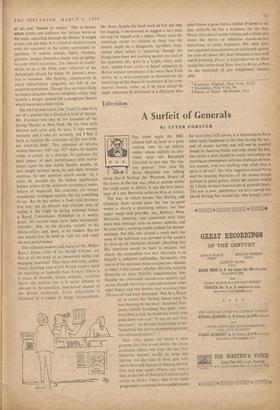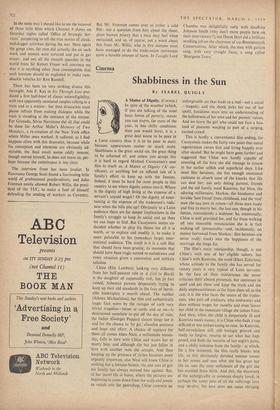Television
A Surfeit of Generals
By PETER FORSTER The way in which heroes, like Stirling and Cheshire, have turned since the war to good works is clearly a promising subject, one that might tempt and provoke, say, Rebecca West. Horrocks, however, was concerned with little more than Stirling's raids on enemy airfields, and he even had a working model airfield for demon- strations. But this, too, played a small part, for most of the half-hour was devoted to the camera in close-up on Horrocks himself. Anything less like television would be hard to imagine, but clearly the assumption was that Horrocks is in himself a sufficient spellbinder. Personally, the charm of his unctuous drone escapes me—indeed, at times I was unsure whether this was actually Horrocks or Alan Melville impersonating him. Equally the celebrated mannerisms quickly pall on me, though there was a splendid moment when eight fingers and two thumbs had to convey that 256 aircraft had been destroyed. 'Not by a flicker of an eyelid did Stirling betray what he was thinking to the men!' throbbed Hor- rocks, eyelids flickering like mad. Later, describing a raid, he smote his breast with great force and said : 'It was the real Nel- son touch !' At the end, he confided to us: `Somebody has got to do something about this African problem!'
Now what appals me about a pro- gramme like this is not simply the cheap emotional effects, nor even the fact that Horrocks seemed hardly to have met Stirling, but the kind of basic glee with which these old men go on fighting the war over and over again. (There was even a hint, at the end of Horrocks's introductory article in Radio Times, that from these programmes we should learn useful lessons for 'next time.') Of course, it is interesting to learn what really happened at the time during the war, and, of course, another war will not be avoided simply by banning books and talks about the last, but surely a start should be made somewhere on creating an atmosphere with less emphasis on mat- ters martial, with less retelling with relish what a party it all was? My own suggestion would be to start by keeping Horrocks off the screen except perhaps in panel games, where the manner would fit. I think we have had enough of generals lately. The war is over, gentlemen; we have moved on; David Stirling has moved on; why haven't you? In the same way I should like to see the removal of those little films which Channel 9 shows on Saturday nights called `Office of Strategic Ser- vices,' purporting to tell the true stories Of cloak- and-dagger activities during the war. Here again the gorge rises, for men did actually die on such work and women were tortured and put in gas ovens : and not all the smooth speeches in the world from Sir Robert Fraser will convince me that it is anything other than contemptible that • such heroism should be exploited to make ram- shackle vehicles for Ron Randell.
There has been no very striking drama this fortnight. Ada F. Kay in No Through Line pro- diked a first half-hour of classic unintelligibility, with two apparently unrelated couples talking in a train and at a station : but then dramatists must please refrain from making dialogue while the train is standing at the entrance of the station. For Granada, Silvio Narrizano .did all that could be done for Arthur Miller's Memory of Two Mondays, a re-creation of the New York office where Miller once worked. It suffered, as I find happens often with this dramatist, because while his conception and intention are obviously ad- mirable, the final result seems oddly remote; though moved himself, he does not move us, per- haps because the contrivance is too clear.
The interview front has been livelier. In Panorama George Scott found a fascinating little world of professional puzzle-solvers, and John Freeman neatly allowed Robert Willis, the presi- dent of the TUC, to make a fool of himself defending the sending of workers to Coventry. But Mr. Freeman comes over as rather a cold fish : not a question from him about the sheer, plain human misery that a man may feel when ostracised, and so, of course, not a word about this from Mr. Willis, who in five minutes must have managed to do the trade-union movement quite a notable amount of harm. In Tonight Lord Chandos was delightfully surly with Geoffrey Johnson Smith (why don't more people turn on their interviewers?), but Derek Hart did a brilliant needling job on the chairman of tne Bournemouth Conservatives, After which, the men with guitars sang, with very straight faces, a song called `Bourgeois Town.'



































 Previous page
Previous page